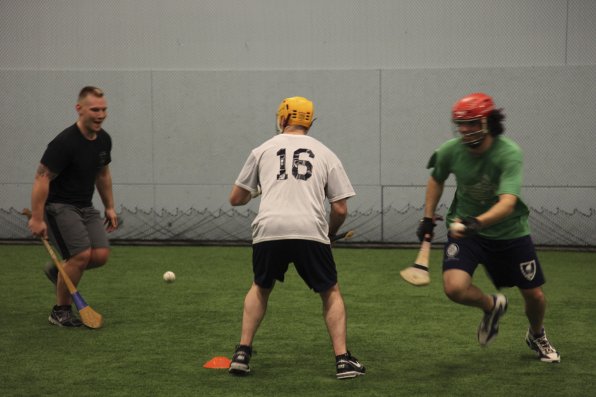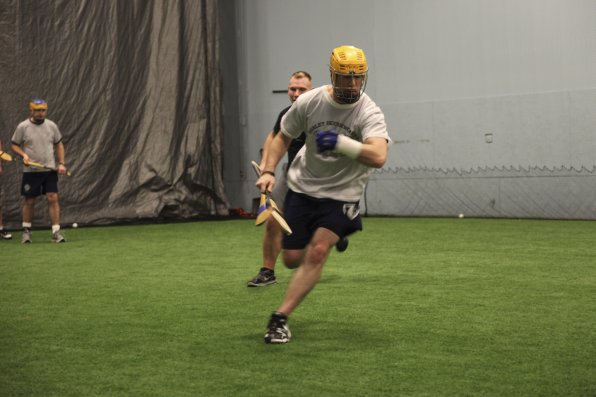In 2004, New Hampshire National Guard C Company, Third Battalion of the 172nd Infantry was deployed to Iraq. The entire unit survived its tour of duty, and in 2005 it returned home. During a brief stopover in Ireland, the unit caught a few minutes of a strange sport that happened to be on television. Men with masks and clubs played a sort of hockey/lacrosse hybrid on a grass field. It was certainly nothing you'd see on ESPN back in the States.
When they finally returned home, Lt. Colonel Raymond Valas wanted to keep his unit in touch and keep the men away from some of the unhealthy pitfalls many soldiers experience upon returning to civilian life. He suggested the unit get together and play the sport they'd seen in Ireland known as hurling.
“We wanted to do something unique and healthy. It served its purpose initially,” Valas said. “Then we realized we really loved the sport.”
Hurling is considered the world's fastest team field sport. With 15 players to a side, teamwork and positioning are the keys to success. Valas said that those factors make it a perfect fit for a military unit.
“There's a direct connection between military teamwork and sports teamwork,” Valas said. “Everybody has their job to do. Some guys it's scoring goals, some it's stopping goals. Some it's driving the Humvee, some it's turret gunner. In the end, it's all about accomplishing that mission on the playing field or the battlefield.”
In fact, hurling was originally developed about 2,000 years ago by Irish chieftains as a way to train their warriors and keep them in good physical shape.
“It's an age-old warrior sport,” Valas said. “As modern-day warriors, that really grabbed us.”
The next step was incorporating themselves into an official team and finding some other teams to compete with. No small task for a bunch of Americans in a predominantly Irish sport. But with the help of local sponsors Irish Electric, North American Equipment Upfitters and The Barley House, they were able to outfit themselves as the Barley House Wolves. The Wolves teamed with the Boston-based Gaelic Athletic Association (GAA) and began playing against the few other hurling teams in New England. At the time, the Wolves were the only team comprised of born-and-bred Americans in the league.
“We were playing against all Irishmen that grew up with a hurley (the wooden stick used to strike the ball) in their hands,” Valas said.
Benefiting from competition that stiff, the Wolves continued to improve their game and are now well-established in the Junior C pision of GAA hurling. The addition of a transplanted Irishman, Ruairi O'Mahony, as the team's coach has also served them well.
“He's lent a level of intensity to the team,” Valas said of the County Cork native.
Intensity is key when playing hurling, and the Wolves certainly aren't short on that. The Insider took in a recent practice; even then one could see the level of competitiveness they bring to the field. Battling for position, fighting over control of the sliotar (ball), these guys leave it all on the field.
The Wolves took their show on the road last year, traveling to Ireland to compete against an Irish army team on their home turf. This year, their focus is on cultivating local talent and competing on the national level. They've started a youth hurling program for children of National Guardsmen, and are currently preparing for this year's hurling national championships in San Francisco.
“This year we're going to make a run at it and give it all we've got,” Valas said.
The Wolves might be a little shorthanded during the championships, as some team members are currently serving in Kuwait and Iraq. Valas hopes to have them back stateside before the championships start.
“A couple of those guys are some of our best players!” Valas said. “They brought their hurleys with them and they're practicing and keeping fit. It's motivating us to get better while they're gone.”
Related content:















